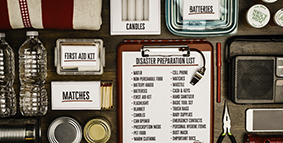
Preparing your finances
Natural disasters such as a flood, severe storm, or fire can happen at any time. These disasters cause damage to homes and property, and create financial challenges. We often prepare for a natural disaster by securing drinkable water, canned goods, batteries, and flashlights. Preparing finances and documents for a natural disaster is also important. Here are some things to help when preparing for, and dealing with, the financial impact of natural disasters.
Safeguard important documents
Safekeeping these documents is vital when dealing with an emergency:
- Originals and copies of your identification such as a driver’s license, passport, Social Security card, and birth certificate. These are helpful if you have to prove your identity. It is best to have originals, but copies are also useful if the originals are lost or destroyed.
- Contact information (including phone numbers and websites) for your banks, brokerage firms, and insurance companies.
- Copies of your financial information such as credit and debit cards (front and back) and checks (front). During a disaster, you may need your account information from these documents to authorize payments.
- Current insurance policy information for homeowner/renter, auto, and life insurance coverages.
- Originals and copies of medical information, such as insurance cards and health records.
- An inventory of valuable personal property. Document the value of the items by keeping receipts and/or written appraisals, and perhaps photos.
Ways to store your information
Emergency evacuation bag: Along with personal safety items in your bag, you should include copies of some of the important documents listed earlier. Large amounts of cash should always be kept in your FDIC-insured bank account, however, you might consider keeping a small amount of cash to purchase food or supplies, in case ATMs and credit cards are not working. Make sure to keep your evacuation bag in a secure and accessible place for a quick exit.
Digital storage: Most documents can be kept electronically. When deciding which documents to keep digitally, consider how to access the documents using your smartphone or a computer. Encrypt sensitive documents and set your electronic device security to require a password, your thumbprint, or facial recognition for additional safety.
Safe deposit box at your bank: This may be an appropriate location for documents that are difficult or impossible to replace, and that you do not need to access frequently. Since most safe deposit boxes are not waterproof, you might also seal these items in waterproof bags or containers in preparation for a flood or other water damage.
Bank availability during a natural disaster
Banks may need to temporarily limit operations because of the natural disaster’s impact to the physical bank branch. This might include closing a lobby, converting to drive-thru only services, or encouraging customers to use ATMs or digital channels to access their services. Consider your digital banking options by reading FDIC Consumer News Banking with Apps article. Regardless of the operating conditions, deposits in an FDIC-insured bank or savings institution will continue to be insured up to at least $250,000 in the unlikely event of a bank failure. Please see additional information regarding FDIC deposit insurance.
How to handle property damage
Report property damage to your insurance company or agent as soon as you can. Don’t throw away damaged goods or make major repairs until a claims adjuster visits your residence. Also, keep receipts for emergency repairs and take photos of the damages, if you can.
Federal assistance with natural disasters is available from the Federal Emergency Management Agency (FEMA). This may include special loans for homeowners, small business owners, or farmers that can be used to repair or replace damaged property.
Financial difficulty
If you do not think you can make your loan payments on time due to a natural disaster, immediately contact your lender. Paying your debts late or not at all can result in penalties, interest charges, and damage to your credit score. It is important to contact your lender as soon as possible to explain your situation. Your lender should be able to work with you on a solution.
Beware of scams during a natural disaster
Dealing with a natural disaster is difficult enough. Fraudsters make matters even worse. They try to take advantage of these situations to steal money and valuable information. If you are a disaster victim, be careful about accepting unsolicited offers to make repairs or assistance. It is especially important to avoid offers that pressure you to act quickly.
Sometimes fraudsters pretend to be representing a charitable organization, so be sure to only deal with charities you are familiar with or have researched thoroughly. Some fraudsters attempt to use the name of a reputable charity and then attempt to direct you to a fake website to steal money and financial information. Do not release your personal or financial information unless you are certain the lender, entity, or person you are dealing with is legitimate.
It is important to prepare your financial impact of a natural disaster. These steps can help ease the challenge of restoring or replacing your property after a catastrophic event.
Additional resources
FEMA: Emergency Financial First Aid Kit (EFFAK) - PDF
FDIC Consumer News: Prepare Your Finances to Weather the Storm
For more help or information, go to FDIC.gov or call the FDIC toll-free at 1-877-ASK-FDIC (1-877-275-3342). Please send your story ideas or comments to consumeraffairs3@fdic.gov.
